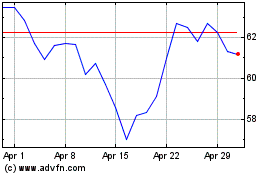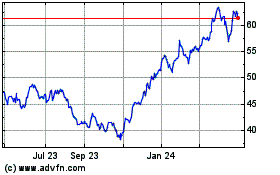Consumer Banking Lifts Citigroup Profit -- WSJ
April 16 2019 - 3:02AM
Dow Jones News
Trading revenue falls but does better than rivals, and
fixed-income rises from a year ago
By Telis Demos
This article is being republished as part of our daily
reproduction of WSJ.com articles that also appeared in the U.S.
print edition of The Wall Street Journal (April 16, 2019).
Citigroup Inc. said its first-quarter profit rose 2% from a year
ago, boosted by growth in U.S. consumer banking and solid trading
performance compared with rivals.
The bank posted a quarterly profit of $4.7 billion, or $1.87 a
share. Analysts polled by Refinitiv had expected $1.80 a share.
Revenue was $18.6 billion, down 2% from $18.9 billion a year
ago. Analysts expected $18.6 billion.
Citigroup, like its big-bank rivals, is aiming to bounce back
from a tough fourth quarter. Its vast trading unit has been
struggling in unfavorable market conditions, adding a fresh
challenge to the bank's plan to meet a series of aggressive
financial goals over the next two years.
First-quarter trading revenue at the bank fell 5% to $4.3
billion. Citigroup and other banks have warned that client activity
in early 2019 still hasn't rebounded after evaporating at the end
of last year.
But Citigroup did better than rivals in the first quarter.
Trading revenue at Goldman Sachs Group Inc. and JPMorgan Chase
& Co. was both down 17% or more from a year ago. Notably,
Citigroup's huge fixed-income business rose 1% from a year ago to
$3.5 billion.
Investment-banking revenue rose 20% from a year ago, to $1.4
billion, thanks to a 76% surge in mergers-and-acquisitions advisory
revenue. Citigroup, whose core business is day-to-day global
transaction banking for large global companies, has been trying to
parlay those relationships into more big-deal assignments.
Citigroup is back in growth mode after spending much of the
decade since the financial crisis regaining strength. Chief
Executive Michael Corbat has been shuffling the bank's leadership
team to put the emphasis on growth, after years of shrinking and
restructuring.
Tougher markets and choppy global growth aren't making that any
easier. To account up for revenue pressure and to stay on track to
meet its return targets, Citigroup has been cutting expenses. Its
expenses were $10.6 billion for the first quarter, down 3% from a
year ago. The bank slashed its marketing and advertising budget by
6%.
"We're going to pull whatever levers we need to pull to get to
the return targets that we've set," Chief Financial Officer Mark
Mason told analysts Monday.
Citigroup said it still expects to produce a 12% return this
year on its tangible common equity, a key measure of banking
profitability. That figure was 11.9% in the first quarter.
Citigroup trails rivals such as JPMorgan, whose return on common
equity was 19% the first quarter.
Ultimately, however, Citigroup is counting on a major turnaround
in its consumer business, particularly U.S. credit cards and retail
banking, to boost its overall returns.
That effort bore fruit in the latest quarter. U.S.
consumer-banking revenue of $5.2 billion was up 4% from a year
earlier, after adjusting for the sale of a co-brand credit-card
portfolio. The proprietary U.S. credit-card unit was up 5% from a
year ago, to $2.2 billion.
The bank had given many consumers interest-free borrowing offers
to build the business, but that cost it interest income. Now, many
of those offers have rolled off, and the same balances are now
making money.
Citigroup also said it was also seeing some success in its
efforts to gin up consumer deposits outside of the big U.S. cities
where it has branches, such as New York and San Francisco. The bank
said it added $1 billion in deposits in digital accounts in the
first quarter.
North American average deposits were 1% higher than a year ago.
Still, that was lower than growth at JPMorgan, where average
consumer deposits were up 3% from a year ago.
The picture is different outside of North America. Adjusting for
currency rates, international consumer banking grew 3% from a year
ago. In good times, Citigroup's stronger international presence
gives it an edge over domestically focused U.S. rivals. But when
global growth slows, it is more vulnerable.
In Mexico, Citigroup's largest market outside the U.S., "we have
begun to see a slowdown" in growth and lending volume, Mr. Mason
said.
Write to Telis Demos at telis.demos@wsj.com
(END) Dow Jones Newswires
April 16, 2019 02:47 ET (06:47 GMT)
Copyright (c) 2019 Dow Jones & Company, Inc.
Citigroup (NYSE:C)
Historical Stock Chart
From Aug 2024 to Sep 2024

Citigroup (NYSE:C)
Historical Stock Chart
From Sep 2023 to Sep 2024
